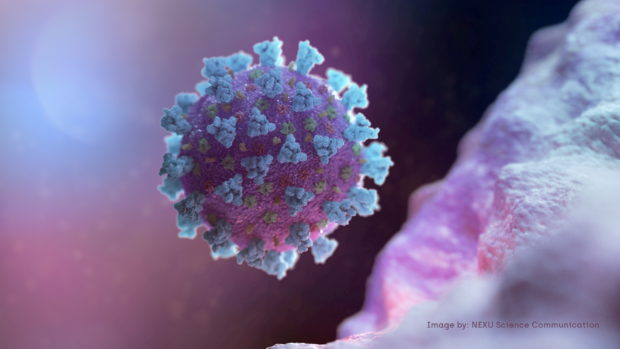Global spike in COVID-19 cases may lead to dangerous variants, scientists warn

A computer image created by Nexu Science Communication together with Trinity College in Dublin, shows a model structurally representative of a betacoronavirus which is the type of virus linked to COVID-19, shared with Reuters on February 18, 2020. REUTERS FILE PHOTO
NEW DELHI — The third wave of Covid-19 lashing countries across the world is creating fertile breeding grounds for extra infectious and probably vaccine-resistant new variants, scientists warn.
The World Health Organization has announced an 80 percent average increase over the past four weeks in five of the health agency’s six regions, a jump largely fueled by the Delta variant.
According to virologists, the SARS-CoV-2 virus that causes Covid-19, might have already developed into extra threatening kinds which have, to date, evaded detection since they have not infected sufficient people, the Financial Times reported.
“We’ve been surprised more than once by the evolution of variants, though maybe we shouldn’t have been because the virus only recently moved into humans and is still adapting to its new hosts,” Nick Loman, professor of microbial genomics at Birmingham University in the UK, said, it reported.
“We’ve been humbled by this virus before and no one can predict confidently what will happen in the future.” Covid infections have surged to a mean of 540,000 per day, and a mean of just about 70,000 weekly deaths, the WHO stated this week. The faster rate of vaccination can reduce the probability of the emergence of a resistant strain.
On the contrary, lifting Covid measures such as mask-wearing and social distancing at a time when over a majority of individuals of the population have already been vaccinated, the probability of emergence of a resistant strain is greatly increased, revealed a recent study by Austria’s Institute of Science and Expertise, in the journal Scientific Reports.
“The institution of a resistant pressure at the moment might result in serial rounds of resistant-strain evolution, with vaccine growth taking part in catch-up within the evolutionary arms race towards novel strains,” it stated.
The scientists noted that evolutions of the virus are inevitable due to the best way the genetic code may be altered by errors within the copying mechanism throughout replication. Most mutations are impartial, however, sometimes one will increase the “health” of the virus, enabling it to contaminate human cells extra simply, the Financial Times reported.
“We’re making an attempt to know why Delta is extra transmissible,” said Maria Van Kerkhove, the WHO’s Covid-19 technical lead. “Among the mutations permit the virus to stick to the cell extra readily and due to this fact infect it.”
“The extra the virus circulates, the extra it’s going to change,” she warned. “Delta won’t be the final variant of concern you hear us speak about.”